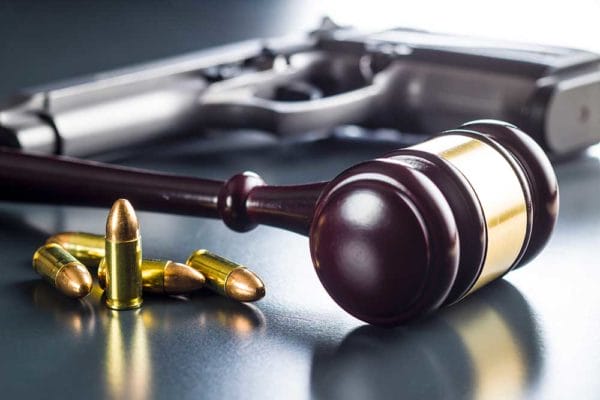
iStock-1055138108
U.S.A. -(AmmoLand.com)- On May 17, 2020, the South Bend Tribune highlighted a story of interesting perceptive which challenges Indiana self-defense laws. The story revolves around a 19-year-old man Kyle Doroszko shooting and killing another teen, Traychon Taylor, in self-defense in April 2019. According to court documents on the night of April 28, 2019, Doroszko and a 17-year-old companion met with Taylor, 19, and three of Taylor’s associates in the back parking lot of Frank’s Place, a bar just northwest of downtown South Bend. Also according to court documents, Taylor’s group was planning to rob Doroszko.
According to the South Bend Tribune,“Prosecutors still charged Doroszko with murder, however, arguing he did not have the right to use force to defend himself because he was trying to sell marijuana and possibly a gun.” The case is testing the limits of the law in the state of Indiana that denies self-defense rights to someone committing a crime. The case already saw a rocky start when, according to the Tribune, “Doroszko claimed he caught officers lying under oath about interactions that were captured on video.” This forced the County prosecuting attorney to recuse himself.
The heart of the issue lies in the complicated question of what types of crimes should take away a person’s right to use force to protect himself? The Tribune writes that the courts in Indiana have wrestled with this question for many years. Joel Schumm, an appellate attorney, and professor at the Indiana University McKinney School of Law is quoted in the Tribune article saying, “The problem is the self-defense statute has language that if you’re committing a crime, you can’t use self-defense. “If you take the statute literally, someone using marijuana or playing in an illegal card game cannot use self-defense no matter what someone does to them.”
The following Except from the Tribune Article sums up the events of the evening:
“According to court documents, Doroszko told police that Taylor, armed with a handgun, tried to steal marijuana and a backpack. Around the same time, one of Taylor’s associates approached and pointed a gun at the vehicle.
“Taylor got in the backseat of Doroszko’s vehicle. Doroszko’s vehicle sped away, and while he struggled with Taylor, he drew a handgun and shot Taylor twice, according to the documents. At the same time, Taylor’s associate, Atlantis Branch, fired at the vehicle. Taylor fell from the vehicle and lay in the street, where police later found him.
Along with the murder charge against Doroszko, prosecutors filed felony murder charges against Branch and Jeremiah Williams, alleging they caused Taylor’s death by participating in the attempted robbery.”
So, you’ve got one kid trying to pass some grass and the other kids who whip out guns to rob the guy. What a mess. To top this off the legal age to buy a handgun in Indiana is 21 and further drives the case down the rabbit hole with potential felony gun charges. The interpretation of the law is particularly interesting since in Indiana it denies self-defense to anyone committing a crime, with no exceptions, even misdemeanors. Other states with similar laws exclude only those committing a “forcible felony.” Now there are two Indiana Supreme Court Justices that have written opinions on the law stating a “non-violent crime with no inherently predictable violent outcome should not negate the defense of self-defense.” The state of Indiana has struggled according to the Tribune article to clarify the law for many years.
Other academics and lawyers see the case at a slightly different angle. “But for the drug deal, this wouldn’t have happened,” said Jimmy Gurule, a professor at the Notre Dame Law School and former federal prosecutor. “This wasn’t some totally unexpected reaction. Historically, drugs and money and guns all go hand in hand.”
So the question lies therein, is it unfair to deny Doroszko the ability to protect himself from an armed robbery because he was selling marijuana? Have prosecutors had over-charged both Doroszko and Taylor’s group?
As both sides prepare for trial a difficult path forward lies ahead. Does the current law, unfortunately, leave both parties at a disadvantage? While I am no legal expert one element I think will have a weighing factor here is, how much moral stake are people placing on the sale of some dope? What is reasonable self-defense? By placing the sale of weed on a pedestal does this negate someone’s ability to defend themselves?
To read the full story click here.
The post Testing Indiana’s Self-Defense Laws appeared first on AmmoLand.com.
from https://ift.tt/2TMtsw2
via IFTTT

 About Jason Reid
About Jason Reid
No comments:
Post a Comment